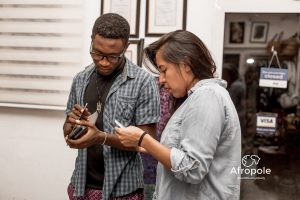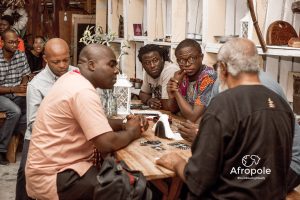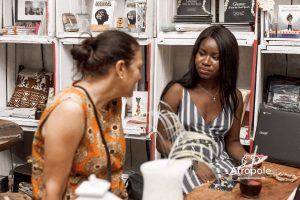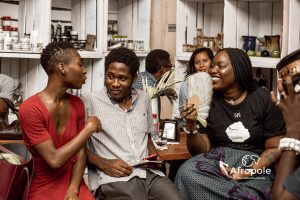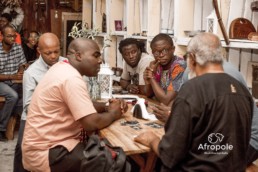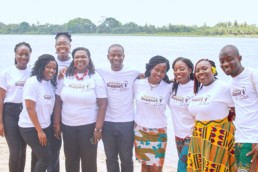“I feel like this movie was more for African Americans than Africans.”
“The truth of the matter is that Wakanda represents a place where black people are celebrated.”
“Wakanda is real. Much of the science we know of today, has roots in African historical practices”
“Isn’t it true that colonization brought about much of the technology that we have in Africa today?”
These are just a few of the many view points that were raised during the discussion at Afropole’s “We Are Wakanda” Black Panther movie review event, held one evening late February 2018 at Osu’s The Shop Accra. Right there, in the middle of a shop that celebrates all things African, having a rich and rewarding conversation for, with, and by Africans living both on the continent and abroad. The discussion was meant to explore three specific themes brought to the fore in Marvel’s world-renowned ‘Black Panther’ blockbuster which was set in a fictional African nation of Wakanda. These themes were:
- Representations of Blackness
- Relationships between people across racial, gender, tribal and diasporan lines
- Resistance theories debated by black thinkers
The discussion was led by a panel of Ghanaians and Americans from various walks of life sharing their knowledge and experiences related to these film themes.
On REPRESENTATIONS…
When considering representations, we discussed everything from music and fashion to architecture and history to colloquialisms and accents. Asking ourselves how well diverse African cultures were represented and how well our cultures were projected into this futuristic space. One person noted that while the accents were off for many characters (have you seen the #mbakuchallenge threads?), it raised a greater question of how well Africans project themselves to the world such that Hollywood would be able to more authentically represent how we spoke. I liked this thinking. I like it because it puts the onus on us to use social media and YouTube and WhatsApp and our own African platforms, such as Leti Arts, to flood a global audience with diverse representations of Africanness. Togbe Gavua, a film director and co-founder of Abstrakte Films, mentioned how important it was for us to put out content that shows us being us – not everyday war or enslaved or gang/tribe wars or in distress or battling evil spirits from a mother in law… but living. Buying food. Talking to friends. Laughing at the barber shop. Fighting with Trotro drivers in a commute to our homes. Sitting in university classes. Praying at Mosques. Thriving.
On RELATIONSHIPS…
Then to the issue of relationships – the juiciest part of the conversation. Asking ourselves, was Killmonger really a villain? Did he represent a truth about the ways in which Africans have largely distanced themselves from the tragedies of slavery and the peoples across the Caribbean and the US that still struggle with the racial castes of the Americas? One attendee put it best, “We need to come to a round table and decide what role we want to play in each other’s tragedies and triumphs”. That’s real. Furthermore, looking at the ways in which women and youth were portrayed in the film left many people asking questions about how long it would take for us to see this in real life. Could we imagine an Africa where a teenage girl would have a voice in how we innovate around our resources? Could we imagine an Africa where women are empowered to raise ideas, defend themselves and others, and sit at the decision making table? Could we imagine a relationship between tribes/ countries/ states that would celebrate our diverse languages, looks, religions and resources while still working in unity to leverage our various comparative advantages? The questions were many. The time was limited. The opportunities abound to discover the answers over the course of the next couple of years.
On RESISTANCE…
We never quite got to the discussion on resistance. And perhaps it’s fitting. Perhaps before we can talk about defending ourselves from enemies outside of ourselves, we need to focus on developing allies within ourselves. Conversations like these are important, but it can’t end here. It starts with us first acknowledging the need to think globally but act locally as it relates to elevating the state of black people around the world. I, for one,am excited about the future we are building. From experimentations in music to architecture to science to prose— we are busily doing the groundwork. This was where the discussion ended, and I think it was quite appropriate. I was glad to be surrounded by so many doers in the event and the perspectives and ideas that were raised represented the diversity of thoughts that need to be considered building the Wakanda of the future.
It has been said, that the revolution will not be televised. But listening to the voices in the room, I think it is clear that it will be digitized. That as we negotiate how we are represented, how we relate and how we resist, we are doing this out loud, online and in open air shops in cities like Accra. The road to Wakanda lies in hundreds of instatories and tweets and facebook live moments that change the narrative. In people working consistently in their corners to address the problems in their space, and linking this with a global narrative of triumph. Music and movies that offer divergent opinions and opportunities to re-iminagine our histories and,by so doing, our futures. Inventions that challenge the value judgements of whiteness and blackness and Africanness and the “West”. The revolution will be digitized and archived and reposted and made viral.
To be cliche, and predictable as ever, I will end with this Nkrumah line:
“It is clear that we must find an African solution to our problems, and that this can only be found in African unity. Divided we are weak; united, Africa could become one of the greatest forces for good in the world.”
#WeAreWakanda #WakandaForever
Written by Amma Aboagye
